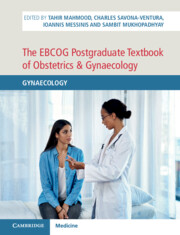Book contents
- The EBCOG Postgraduate Textbook of Obstetrics & Gynaecology
- The EBCOG Postgraduate Textbook of Obstetrics & Gynaecology
- Copyright page
- Dedication
- Contents
- Videos
- Contributors
- Preface
- Section 1 Basic Sciences in Gynaecology
- Section 2 Menstrual Disorders
- Section 3 Reproductive Endocrinology and Infertility
- Section 4 Contraception and STIs
- Section 5 Post-Reproductive Care
- Section 6 Vulva and Vagina
- Section 7 Cervix
- Section 8 Uterus
- Section 9 Ovary and Fallopian Tubes
- Section 10 Operative Gynaecology
- Section 11 Public Health Issues in Gynaecology
- Section 12 Miscellaneous
- Chapter 58 Prophylactic Bilateral Salpingo-oophorectomy
- Chapter 59 Immunotherapy for Gynaecological Cancers
- Chapter 60 Radiotherapy for Gynaecological Cancer
- Chapter 61 Clinical Audit and Risk Management in Gynaecology Practice
- Chapter 62 Research in Obstetrics and Gynaecology
- Chapter 63 Skills Training and Simulation
- Chapter 64 Practical Medical Education Science for Clinical Teaching Sites
- Chapter 65 Algorithm for Managing Vulvovaginal Symptoms
- Index
- Plate Section (PDF Only)
- References
Chapter 58 - Prophylactic Bilateral Salpingo-oophorectomy
from Section 12 - Miscellaneous
Published online by Cambridge University Press: 24 November 2021
- The EBCOG Postgraduate Textbook of Obstetrics & Gynaecology
- The EBCOG Postgraduate Textbook of Obstetrics & Gynaecology
- Copyright page
- Dedication
- Contents
- Videos
- Contributors
- Preface
- Section 1 Basic Sciences in Gynaecology
- Section 2 Menstrual Disorders
- Section 3 Reproductive Endocrinology and Infertility
- Section 4 Contraception and STIs
- Section 5 Post-Reproductive Care
- Section 6 Vulva and Vagina
- Section 7 Cervix
- Section 8 Uterus
- Section 9 Ovary and Fallopian Tubes
- Section 10 Operative Gynaecology
- Section 11 Public Health Issues in Gynaecology
- Section 12 Miscellaneous
- Chapter 58 Prophylactic Bilateral Salpingo-oophorectomy
- Chapter 59 Immunotherapy for Gynaecological Cancers
- Chapter 60 Radiotherapy for Gynaecological Cancer
- Chapter 61 Clinical Audit and Risk Management in Gynaecology Practice
- Chapter 62 Research in Obstetrics and Gynaecology
- Chapter 63 Skills Training and Simulation
- Chapter 64 Practical Medical Education Science for Clinical Teaching Sites
- Chapter 65 Algorithm for Managing Vulvovaginal Symptoms
- Index
- Plate Section (PDF Only)
- References
Summary
Ovarian cancer is the second most common gynaecological malignancy but is the most common cause of gynaecological cancer death. Ovarian cancer screening has not been proven to be associated with statistically significant reduction in mortality from ovarian cancer. However, evidence demonstrates that prophylactic bilateral salpingo-oophorectomy significantly reduces the risk of developing gynaecological and breast cancer in women who carry BRCA1 and BRCA2 mutations.
Moreover, there is 4–20% incidence of histological diagnosis of occult ovarian malignancy found after prophylactic surgery. Identifying and counselling patients with hereditary conditions that predispose them to higher chance of breast and gynaecological cancer is extremely important. Clinical information should include protective measures, fertility implications, surgical premature menopause and its short- and long-term implications and availability of hormone replacement therapy.
- Type
- Chapter
- Information
- The EBCOG Postgraduate Textbook of Obstetrics & GynaecologyGynaecology, pp. 499 - 502Publisher: Cambridge University PressPrint publication year: 2021

